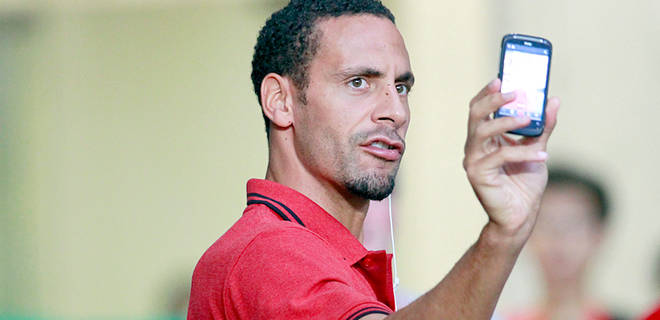Why better Social Media policies are needed in Sport
Discussion and Analysis
After collecting the primary data to provide the basis of this research, an in-depth look into how the sportspeople researched in the content analysis are categorised into ‘tweeters’, ‘twits’ and ‘twats’ to provide the context for the need of social media policy. Sport corporate communicators can identify which sportspeople have the biggest influence and impact on reputation. Using the formula to analysis each tweet, corporate communicators can categorise each post from the individual who has used social media. The graphic below shows the sportspeople who were analysed, and based on their score, they were placed in one of the three categories. However it is worth pointing out that the ‘Twit’ category is still of massive concern to corporate communicators, despite these sportspeople using social media well, they still have posts that will be seen as negative to corporate reputation.
Figure 1: Tweeters, Twits and Twats Model
Whilst using the graphic to identify those who are influential, corporate communicators can go on identify strategic business objectives to target inappropriate social media use. This research, as well as the formula used before can be used to justify the awareness, knowledge, interest and support of using and implement a tougher social media policy. Knowledge and research is key and with these measurements, corporate communicators will be able to set clear, achievable business objectives to tackle social media abuse.
Tweeters
The first of these categories, Tweeters, consists of those that use social media, at all times appropriately and in line with corporate standards, knowing full well their messages can be used to attract attention and be created as stories. Not only will a good ‘Tweeter’ do this, he or she will identify the number of times they have tweeted, how good they are at re-tweeting other people’s messages and the number of times their post were re-tweeted by other people reflects positively on corporate reputation.
A good Tweet is like a good book or a good film – different people have different tastes. Nevertheless, most people consider ‘Saving Private Ryan’ superior to ‘Saturday Night Fever’. Most people find that the experience of reading ‘Great Expectations’ enriches them more than ‘First Among Equals’. In the same way, there is an emerging consensus about what makes a good Tweet, and, more importantly, a good Tweeter.
This was completed by detailed content analysis that was evident in the secondary research. It appeared that many sportspersons, overall, are using it appropriately. They are engaging with fans, using posts to promote the organisation and in the meantime providing some personality to make their social media accounts interesting. Characters like Michael Owen, Jenson Button and Stuart Broad all show great traits at being good ‘tweeters’. All of them engage openly with their audiences, inform followers of deep insight in their lives and will always speak favorably of the team they represent.
These accounts appear more corporate and acceptable than others. Some social media users are accustomed to all sorts of corporate speak, but they know using the corporate tongue can be severely off putting. These use social media to share information, ask questions of followers, offer personal thoughts and insights into their sport, and, most importantly, appear to have a conciseness.
This tends to mean that these sportspeople become influential with their followers, because their tweets are interesting. Each tweets offers reason and something for their audience to engage in. Even tweeting in a ‘work’ capacity, they are communicating to the world at large. The ultimate goal maybe to become more popular after a relatively short career span sport gives you, or they may be targeting stakeholders, fans, supporters, possible employers, sponsors, or more influential individuals. Michael Owen, for instance, often engages with fellow footballers and journalists to provide context and make his tweets interesting. He understands, more than most sportspeople, that Twitter is ultimately about engaging and broadcasting.
If sportspeople are engaging with stakeholders on a regular basis, it is up to corporate communicators to ensure messages surrounding the organisation remain professional to prevent any possible individual and corporate conflict. At the very least, sportspeople will be educated on how to make the most twitter and engagement. A policy will certainly come in handy for those who do not understand Twitter and use it simply to ‘banter’. These people will be known as ‘twits’. To really prove this point, you would need to ask followers and supporters whether they respected the club better because of what i.e. Michael Owen tweeted. This would be a great area for some further research.

Twits
On a greater scale ‘Twits’ do not use social media inappropriately, but bordering on it. At best neutral, their tweets are not aimed at enhancing the corporate reputation of their clubs. These accounts do not use Twitter to provide great insight into their lives, nor do they use it to engage their followers. It appears, from the content analysis that they use Twitter as either a form of broadcasting, to banter with mates/colleagues or to spit out what they are feeling as individuals, irrespective of what effect it has on the club or their teammates these can either enhance or damage reputation or corporate image.
Most commonly with the rugby players in this content analysis, the majority of their tweets are aimed at colleagues or fellow rugby players to ‘banter’. They cannot be so naïve as to think that the public is not listening, but even if they are, corporate communicators would still want to nullify the majority of these tweets as they can be used as the basis of news stories and speculation. Thankfully, rugby is not as popular as other mainstream sports so the size of the audience may not be as detrimental, but it can hugely influential even in a smaller community of fans. Despite that sounding like a good comprise, with not too many picking up on their tweets, it means that these ‘Twits” are not using social media to its full potential and not in tune with corporate reputation. This will ultimately cause conflict between the individual and the organisation, especially if there is no procedure or guidelines put in place to prevent harmless tweets become harmful.
Many of these sportspeople tend to ‘blow their own trumpet’. These are a few that happen to be in desired professions of many, but those who use twitter bordering on inappropriately will ‘re-tweet’ praise about themselves, and will use self-promotion to promote external business ventures and friends’ Twitter accounts. A few sportspeople, like Graeme Swann and James Haskell use Twitter almost exclusively for ‘bantering’ purpose or purely making it about their thoughts and actions. They may think this is good tweeting; however, these sportspeople can come across as egotistical and self-serving. They may have many followers, but it may be because of their performances on the pitch rather than their ability to communicate. Corporate communicators will need to teach and encourage these ‘egos’ to use social media appropriately. These accounts, with a little and guidance, can be used to great benefit by both the individual and the organisation and with a social media policy being used as a guidance, conflicts will be avoided. However, some social media accounts go far beyond this and use social media very inappropriately. These are known as ‘Twats’; i.e., those who use social media in a manner that is destructive of corporate reputation.

Twats
The English colloquial term ‘Twat’ speaks volumes about some individuals that use social media inappropriately, resulting in heavy reputation damage of the organisation and to the individual as well. With football being global and the players’ appealing across a broad spectrum of social media users, their posts are constantly analysed for any possible slip. Footballers Rio Ferdinandand Joey Barton are two excellent examples. Both are footballers of certain stature and both tend to constantly be in trouble with the governing bodies or their club about their social media use. Even though that are not in the ‘Twat’ category, they are both heavy social media users and when they publish a negative tweet, it has an incredible response.
Ferdinand, for instance, with over 3m followers, has been found guilty of improper conduct and was subsequently fined £45,000 by The FA for comments on Twitter (source: www.bbc.com, August 12 2012). An independent Regulatory Commission found the Manchester United defender had brought the game in disrepute after referencing to colour of skin in a tweet. Ferdinand denied he was being racist after responding to a tweet describing his England colleague Ashley Cole as a “choc ice”. As Ferdinand’s content analysis will show, this brought out a surge of reaction and the footballer subsequently tried to defend himself and deleted the tweet. The damage had been done. Manchester United’s hands-off approach (They are the only club not to operate a club Twitter account) showed Ferdinand by himself against his followers. Plenty of news stories were created, and it made back pages in the media. This act of foolishness gave Ferdinand’s reputation as big hit, and because his name is associated with Manchester United, it received bad publicity too.
Rio Ferdinand’s tweet: “I hear you fella! Choc ice is classic. Hahahahahaha!!”
He later deleted the tweet and claimed on Twitter that it was slang for someone being “fake”, but the FA charged him with making improper comments that included a reference to ethnic origin and/or colour and/or race. In the aftermath, he soon defended the use Twitter claiming:
“I treat it as fun. I don’t take it too seriously to be honest.”
Referring back to the research, Ferdinand’s comment above suggests everything why a social media policy is needed in sport. Treating a major communication tool as “fun” shows no clear consideration for corporate reputation and the impact of his organisation. His manager, Sir Alex Ferguson, adds on the Ferdinand’s fine: “Twitter, I don’t understand. I don’t understand why you’d bother.” Clearly, he was upset with the fine and how one of his leading employees managed to get into trouble. This blatant lack of understanding needs urgent addressing and it is up to corporate communicators to take the initiative and lay out set guidelines for all employees to follow.
More frustrating for corporate communicators, Ferdinand, who has over three millions followers, all with a considered interest in the football and the club he represents, does not take social media “too seriously” and this is one sportsman that is clearly visible to the wider public. Not only his inappropriate use of social media will land him in trouble, as already previously stated, his club will have plenty of negative publicity being associated with him. Images of the footballer in the organisation’s colors will be on every leading news website and every back page of the written press. While the use of sanctions, fines and public rebukes are a way of restraining misuse of social media; it would have been far more effective to avoid the problem in the first place.
About author
You might also like
SPORTEL 2021: Day One Recap
This year’s prestigious SPORTEL convention kicked off in sunny Monaco today, welcoming a host of familiar faces as well as plenty of new ones. Doors opened at 8:30am with businesses
Six Founding Riders Set To Bring The Vision Of The UCI Track Champions League To Life
Olympic Champions, UCI World Champions and World Record holders join the new track cycling competition debuting in November 2021 The UCI Track Champions League is delighted to announce that six
Sports related spending to soar this summer as pre-pandemic life resumes
New insights from eBay Ads UK reveal the potential for brands to engage with an excited but nervous nation as sports events get back on track As pubs and indoor









